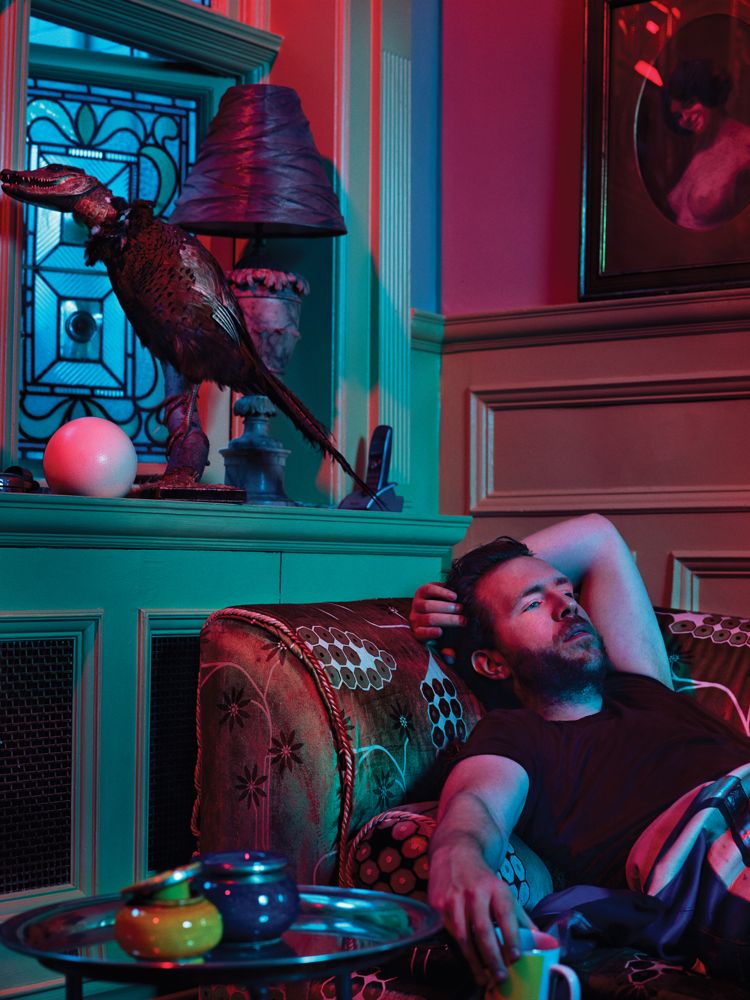Rafe Spall

ABOVE: RAFE SPALL IN LONDON, JULY 2013. JUMPSUIT: LEWIS LEATHERS. T-SHIRT (THROUGHOUT): ARMANI EXCHANGE. SLIPPERS: G.J. CLEVERLEY. GROOMING: HALLEY BRISKER/JED ROOT.
People develop these extraordinary bonds in theater. You might not be going over to each other’s houses every night, but you know you’ve been through something special. Rafe Spall
Threesomes can be messy, so the fact that British actor Rafe Spall has chosen to make his American theater debut smack in the middle of a high-profile one—and on Broadway no less—is bold, to say the least. But the opportunity to star alongside real-life couple Daniel Craig and Rachel Weisz in a new Mike Nichols-directed production of Harold Pinter’s infamous infidelity tale Betrayal proved too seductive and tantalizing a proposition to pass up.
For avid Pinter-ites, Betrayal is considered among the playwright’s most significant and personal dramatic works, a play inspired by Pinter’s own affair in the 1960s with BBC anchor Joan Bakewell, which sketches a clandestine seven-year relationship involving a married couple (Craig and Weisz) and their close friend (Spall). (The only other character to appear on stage is an unnamed waiter.) However, a key storytelling feature of Betrayal is that the action occurs in reverse chronological order, beginning, as it were, with the end of things, and ending with the beginning of them. The play, which was initially produced at the National Theatre in London in 1978, with Penelope Wilton, Michael Gambon, and Daniel Massey in the principal roles, first hit Broadway less than two years later with Raul Julia, Blythe Danner, and Roy Scheider handling starring duties. A 2000 revival featured Liev Schreiber, Juliette Binoche, and a pre-Mad Men John Slattery as the romantically tangled triumvirate. (For the Pinter unfamiliar, Betrayal also served as the blueprint for the famous 1997 “backwards” episode of Seinfeld involving Oh Henry! heiress and “braless wonder” Sue Ellen Mischke’s wedding in India to an ex-boyfriend of Elaine’s—in reference to the source material, also named Pinter.)
For Spall, a father of two who is married to actress Elize du Toit and is the son of veteran actor Timothy Spall, Betrayal, which is currently in previews and set to open later this month, comes in the midst of a career watershed, following his Olivier Award-nominated run last winter in London’s West End in Nick Payne’s Constellations and his recent appearances in Ridley Scott’s Prometheus, Ang Lee’s Life of Pi, and the sleeper British rom-com I Give It a Year.
During a brief visit back to London, Spall, 30, took time out during rehearsals to sit down with actor Eddie Redmayne at the Royal Court Theatre Bar & Kitchen in London, where they discussed his long road to Betrayal, the challenges and benefits of having actors in the family, and the feverish anticipation—and intense scrutiny—surrounding his Broadway breakout.
EDDIE REDMAYNE: So you’re doing this play now about relationships and affairs, with one of the greatest living directors, Mike Nichols, and two of our greatest living theater and film actors, Daniel Craig and Rachel Weisz—and you’re doing it on Broadway. You’re not exactly tiptoeing your way into New York, are you?
RAFE SPALL: No. I mean, it’s an extraordinary situation to find yourself in. One minute, you’re watching daytime TV and playing with your kids, and the next, you’re there with Mike Nichols and Rachel Weisz and Daniel Craig in a rehearsal room … And then you go home and you’ve go to change shitty nappies, which is a very grounding thing.
REDMAYNE: The play is about an affair but it also screws around with time. The scenes don’t happen in the same chronological time as the action.
SPALL: It plays backwards. It’s a really clever device. Essentially, time goes backwards, so the play starts two years after the end of the affair and then charts back to the beginning. So you get to 1975 and then it plays forward, and then later on it goes to 1971, and it plays forward, and so forth. So it goes incrementally backward and forward.
REDMAYNE: For your sanity as a trio of actors, did you rehearse it all in the chronological order of the affair?
SPALL: No. We rehearsed it as it was written. We did read it, though, as an exercise, in its “proper” order chronologically, as it were, and it’s amazing what gets lost in terms of the tension and the pathos. Pinter wrote a lot about memory in his plays—about how we remember things differently and how our lives are made up of those memories, however skewed or real they might be.
REDMAYNE: In many ways, that’s what Betrayal seems to be about. It deals with the emotion of affairs through memory and, in a way, the logistics involved. It sort of deglamorizes it a bit.
SPALL: Exactly.
REDMAYNE: You’ve never done a play in New York before, have you?
SPALL: No.
REDMAYNE: What’s your sense of Broadway so far? How do you reckon it compares to what we’re used to in London?
SPALL: Well, the rehearsal process on this was different, but that changes with every play that you do. Every director has a different process. Then, obviously, I’ve never worked with Mike Nichols, which is a lot of fun. There has been a lot of laughing involved. I was actually speaking to an American actor who knows Mike, and I said to him, “Mike is so funny.” And this actor said, “Mike is not funny. Mike invented funny. We’re funny because of Mike.” [Redmayne laughs] Which is sort of true, because Mike pioneered a kind of live improvisational comedy with Elaine May. They were in the Compass Players, the predecessor of Second City, which ended up giving birth to things like SNL. So his quickness is extraordinary. Also, Daniel and Rachel both have really great senses of humor. The thing about Pinter’s work, too, is that it should be funny—although I’m hesitant to talk about how one should approach Pinter before I’ve done it and seen the reviews. [laughs]
REDMAYNE: Who chose the play?
SPALL: I think Mike chose it. He and the producer, Scott Rudin, had done Death of a Salesman together, and this is what he decided to do next. Mike knew Pinter. They were friends. So Mike chose Betrayal. It’s funny because I’ve read every word of Pinter. I don’t know why, but I’ve always been drawn to him. My dad took me to see The Caretaker with Michael Gambon when I was about 17, and it blew my mind. It’s a naff, cheesy thing to say, but I’ve always had a connection with his work that I haven’t had with Shakespeare or Ibsen or really any of the other preeminent stage writers. I’ve just got this thing for Pinter. I’ve literally read everything he’s done. There’s a brilliant book of his called Various Voices: Prose, Poetry, and Politics. I just never thought Betrayal would be the first Pinter play that I would do because it’s about the bourgeois middle classes. I mean, it’s sort of impossible to be the son of an actor and be anything other than middle class. I’m about as middle class as they come. But I do have a bit of a London accent and I do sometimes get cast in those parts, so I would have thought that The Caretaker or The Homecoming, which are two of my favorite plays, would have been ones I might have done. But for some reason, it’s happened that it’s Betrayal.
REDMAYNE: I need to ask you the obvious question—which, of course, you’re going to have to get used to answering with Betrayal—but you’re playing the third wheel in a story that is ostensibly about an intimate affair involving two best friends and one of their wives. Then, of course, you’re acting with Daniel Craig and Rachel Weisz, who are married. I know there is a fourth character in the play …
SPALL: The waiter.
REDMAYNE: But the waiter appears only very briefly. So it’s basically the three of you up there, which sounds like an incredibly intimate experience. How was it then turning up to work on the first day with these actors who are married in real life and being the third person in the mix?
SPALL: Well, it’s a bit of a boring answer, but none of that has really come up. We’ve never really spoken about it. I mean, aside from the fact that Daniel and Rachel are both movie stars and married to one another, they are also extraordinarily talented actors, and they’ve both done a lot of stage work. Of course, there is always a sort of awkward thing that happens in any sort of rehearsal room. I’m someone who draws from his own experiences when I approach a play. I find that I actually relate everything that I’m trying to portray to some aspect of my life, and that’s a very vulnerable position and a very open position to put yourself in, in a rehearsal room, so you have to make the decision to do that. But regardless of whether two people in the play are married, it’s an exposing thing, so you have to take the plunge and do it because it’s one of the best things about acting, that quick openness you get with other people.
REDMAYNE: That shorthand.
SPALL: That shorthand. On the first day of rehearsals, you can wind up exposing things about yourself that you haven’t even told your best friends. That’s why a rehearsal room becomes a very sacred place—because it is such an incredibly intimate thing.
REDMAYNE: You’re safe, and then suddenly, one day, when you do the first preview, there are 1,000 people there.
SPALL: But you’ve got to do it. This is the thing.
REDMAYNE: That’s one of the big differences between film and theater. With theater, you’re ultimately going to be performing live in front of an audience every night, so you, as actors, really are relying on one another, and as a result, there has to be a kind of trust that develops. Whereas with film, you can sometimes be a bit more selfish because you just have to get through the moment when the camera is on you.
SPALL: That’s why people develop these extraordinary bonds in theater. You might not be going over to each other’s houses every night for dinner, but you know that you’ve been through something special. I’m doing a film at the moment with Sally Hawkins, and I’ve done a play with her before, Constellations, which was just the two of us, so we have this bond because of the trust that you have to instill in one another. In America, you also have the green light and the red light backstage, don’t you? When you’re just about to go on, the red light starts flashing, and when the red light starts flashing, you press it so it stops to let the stage manager know that you are there, and then you know the green light is going to come on, and when that happens, you have to go on.
REDMAYNE: You just made me start sweating. I’d forgotten about the flashing lights.
SPALL: Just that feeling of terror and standing there going, “I could be at home now and I’m choosing to do this.” I often get that a split second before I go on—along with a tiny millisecond of extreme confidence. I mean, this is my absolute ambition achieved—I have always dreamed of doing a Pinter play and I have always dreamed of performing on Broadway, and somehow, the planets have aligned. But it’s a really weird feeling now because it’s getting closer to the point where it’s unavoidable. It’s going to happen, and I am so lucky to be doing it, but as tremendous as that all is, you still have a kind of fear and a terror about it like you do in any job. There is that crushing inevitability I was taking about when you do a play. There’s nothing you can do to get out of it. The closer you get to the opening, the less likely it is that someone else will take over. You have to do it. You’ve got no choice, which is scary.
REDMAYNE: Have you ever had any shockers onstage? Have you ever blanked?
SPALL: Oh, yeah. I’ve had catastrophic dries. I just didn’t turn up for a scene once.
REDMAYNE: Really?
SPALL: I was supposed to come on for a scene and I just didn’t.
REDMAYNE: [laughs] How did that go?
SPALL: Terrible. You get the announcement over the Tannoy: “Rafe Spall, you are off.” Simple as that: “You are off.”
REDMAYNE: Is that what it says?
SPALL: That’s what it says.
REDMAYNE: What were you doing?
SPALL: It was at the Lyric Hammersmith in London. The stage there is four flights up, and I was down in my dressing room, having a chat with somebody. I had a really big scene followed by a really small scene, and I just forgot about the small scene because I was just getting over doing the big one.
REDMAYNE: It’s a weird moment when something like that happens in the theater, isn’t it? You’ve had nightmares about it your whole life, and when it happens, it’s almost like it happens in slow motion. You forget a line or something onstage and you look out at the audience in front of you and you’re like, “This is the moment I’ve dreaded all my life and it’s happened.” But it’s also kind of weirdly chill.
SPALL: Yeah, it’s really chill now. [laughs] But you’re right—it does seem to happen in slow motion. When we did Constellations, we had a week of terrible incidents in the audience. Once, a drunk heckler got in. Another time, near the end of the play, during a very quiet moment between Sally and me, a man went [makes groaning sound]. I didn’t know if he was dying or what. But we carried on—which is what you do. You have to stop, though, when you hear the immortal call, “Is there a doctor in the house?”
REDMAYNE: Did you make the call?
SPALL: No, somebody in the audience did. I just took Sally’s hand and walked off stage, and then this poor gentleman was taken out.
REDMAYNE: Was he okay?
SPALL: He was fine.
REDMAYNE: I had one of those moments when I was doing Richard II at the Donmar [Warehouse], when I heard somebody make the exact same noise that you’re describing. I was doing a scene with Ron Cook, and staring at him very intently, trying to stay in the scene, but eventually I was like, “Is there a doctor in the house?”
SPALL: Did you say it?
REDMAYNE: Yeah. The hilarious thing about the Donmar audience was that about 50 hands went up. Everyone was like, “I’m an osteopath!” “I’m an acupuncturist!” I was like, “Why haven’t we a heart surgeon?”
SPALL: So you just stopped and went off and carried on?
REDMAYNE: We went off stage, and then the extraordinary thing was that when we came back, we went back a wee bit, and you could see the audience react to watching us do the same thing again … It took us a while to win back the audience.
SPALL: Audiences love mistakes, though, don’t they? Because they feel part of it.
REDMAYNE: It’s interesting because there is, of course, all of your theater work, and then I look at the films you’ve done over the past couple of years, from a massive studio sci-fi thing like Prometheus, to a British romantic comedy like I Give It a Year, to Life of Pi—all of these things couldn’t be more different from one another. Is that something you aspire to? Or are those just the kinds of projects that you’ve been lucky enough to have been offered?
SPALL: It’s something that I’ve definitely paid attention to, which I think has something to do with being English. I think one of the main differences between being an English actor and being an American actor is that we have things like the class system in England. Let me reiterate: I’m middle class. But I’ve got what some people might consider to be a working-class accent, so you’ve got those sorts of elements in this country to consider, which, in America, exist, but not necessarily in the same way. For the most part in America, if you’re right for the part, then you’ll get in the door and have a shot at the job, whereas in England, people have preconceptions. It’s a big thing for actors because everyone wants to go, “Eddie Redmayne is that guy who does that thing. That’s only what he does. We’re not going to cast him as a Soho drug dealer.”
REDMAYNE: [laughs] Damn it!
SPALL: But you’ve paid attention to trying to remain versatile and not just playing posh-boy parts, which is the same thing I’ve done by turning down some parts that came my way early on in my career, which would have been in more geezery London-gangster films.
REDMAYNE: Is that something you’ve taken advice on? Has your father been helpful in that?
SPALL: Yeah, absolutely. My dad is a character actor, and character actors are required to play a wide range of parts.
REDMAYNE: I don’t know that I ever told you, but I saw your dad play Bottom once.
SPALL: Really?
REDMAYNE: Yeah. As a kid, I saw A Midsummer Night’s Dream, and your dad was playing Bottom and the woman playing Puck was a contortionist. My mum and I went on a tour behind the scenes afterwards—you could pay for a little tour. But that was one of the experiences that made me want to become an actor.
SPALL: That’s amazing! I remember that play.
REDMAYNE: It’s interesting, though, because my family isn’t involved in this world, so when I do a play, they will come in and be very supportive and say, “It’s wonderful.” And then I can sort of time my mum to when, like, 23 and a half minutes afterwards, she’ll go, “Do you think you had your hands in your pockets too much?” [Spall laughs] I can’t imagine what it’s like having a dad who is an actor, though. What’s that like?
SPALL: Well, my dad is an actor and my wife is also an actress, and those are the two people whose opinions I value over anyone else’s. I mean, I’m always trying to impress my wife. Since the day I met her, I’ve been showing off in front of her and trying to make her laugh and trying to make her think I’m a cool guy. [laughs] That has never gone away. And then I get more nervous about my dad coming to see me act than I would about the whole of London’s press coming, because my dad is my hero. He is my hero as an actor. He is my hero as a man. My entire education in acting has come through my dad. I didn’t go to drama school, so he is the complete architect of my tastes in terms of what is good and what isn’t. So to have him coming to see me act is a scary thing because I want him to think I’m good. I think we all seek the approval of our parents, but especially if your dad does the thing that you do …
REDMAYNE: You know, when I started out, getting an episode of Doctors or The Bill was a massive deal for me. But one of the things I’ve noticed from my pals who have actor or director parents is that they tended to look more at the quality of the scripts and things like that—probably because that’s how they were used to thinking about things. Was it harder for you to take on some of those early jobs? Would your dad be dismissive of certain things?
SPALL: It’s so funny you should ask that because I was thinking about this the other day. One of the first jobs I was ever offered was Midsomer Murders, which, to explain for an American audience, is this sort of Sunday-night murder-mystery soap opera. I turned it down, though, and my dad was outraged.
REDMAYNE: Really?
SPALL: He was like, “Who do you think you are?” He said, “You should be so lucky.” But I was like, “I thought you would think that it wasn’t good.” But my dad was a sort of realist. He was very aware of how difficult it is to make a living out of this ridiculous thing that we do. But then, in turn, the reason that I ever thought that it could be a legitimate way to make a living is because I saw my dad doing it. Now, if my dad had been an unsuccessful actor, I might not have gone into this profession. I might not have had the lack of fear about the industry, which has given me a lot of blind confidence founded on nothing other than the fact that my dad made a career out of it.
REDMAYNE: How does that make you think you’d relate to your kids if they wanted to become actors?
SPALL: Well, again, I have a really great time doing it and I think it’s a really delicious way to spend your life. But you’ve got to have the breaks and you have to be lucky and you have to be at the right place at the right time. Obviously, it can be awful and embarrassing and humiliating and all of those things, too. But then it also sometimes puts you in rehearsal rooms with Mike Nichols or on film sets with Ang Lee, and you feel like you’re breathing a rarified air and it allows you to have the sorts of experiences that punctuate your life and you write memoirs about. But you and I have both known people who we could have been, who started out at the same time as us, who we know are more talented than us, but who just haven’t had the same breaks. When I was 15, my dad asked me if I would want to audition for the National Youth Theatre and I said, “Yeah.” So he said, “All right, then. Learn a speech”—because you do a speech for the audition. So he got me to learn a speech from Julius Caesar. “O pardon me, thou bleeding piece of earth …” Mark Antony’s speech. So I learned it and he got me to come in and do it for him. He sat on the sofa with a glass of wine, and I came in as a 15-year-old boy, shaking because it was first time my dad had really seen me act, and I did this speech. But he was as nervous as I was. If I was useless, he’d have to tell me because he’d have to save me. But he saw some morsel of something in me. I don’t know what it was—some sign that I might have a tiny iota of something to offer. But he would also have had to not encourage me if I was useless, and I would like to think that I would find it in myself to do the same for my children. But in terms of growing up around actors, you know, my parents had a young family, too. They couldn’t go out because they had three kids, so everyone came to us, which meant that I was around all these extraordinary characters and extraordinary actors. There were Sunday lunches that would go on until three o’clock in the morning with people telling stories and dancing. That’s what I want for my kids as well. I mean, this is the thing about what we do: If you want to do it, then there’s no stopping you. Even if you are useless, if you want to do it, then you do it. That’s the thing my dad has always instilled in me: It’s not that you want to do it, it’s that you have to do it.
REDMAYNE: So what’s coming up?
SPALL: Yeah I’m just finishing off this film that I’m doing with Sally Hawkins and Asa Butterfield. I’m playing a math teacher. You’re about to go play a physicist, aren’t you?
REDMAYNE: [laughs] I’m going to play a physicist, which is vicious irony given that I studied art history. How’s your math?
SPALL: Terrible. I had to do a thing where I had write out a massive formula on the board …
REDMAYNE: I have to do that as well.
SPALL: You just have to parrot it. I had to write out a thing called … I don’t know what it was called. I had no idea what it meant either.
REDMAYNE: Just do it with conviction.
SPALL: Yeah, just do it with absolute conviction.
REDMAYNE: With Stephen Hawking, I’m just worried about people asking me physics questions during the press tour.
SPALL: Constellations was about physics—quantum physics, the multiverse, string theory, and stuff like that.
REDMAYNE: Wormholes.
SPALL: Wormholes, yeah. I could never get near understanding that, but we pretend that we can. That’s one of the great things about what we do. We get to learn little bits about what other people do.
REDMAYNE: Do you like that? Becoming a mini-specialist in different areas?
SPALL: Absolutely. It means at a dinner party you’ve got something to say about everything.
EDDIE REDMAYNE IS A TONY AWARD-WINNING ACTOR.HE RECENTLY COMPLETED FILMING JUPITER ASCENDING AND WILL STAR IN JAMES MARSH’S THEORY OF EVERYTHING.






